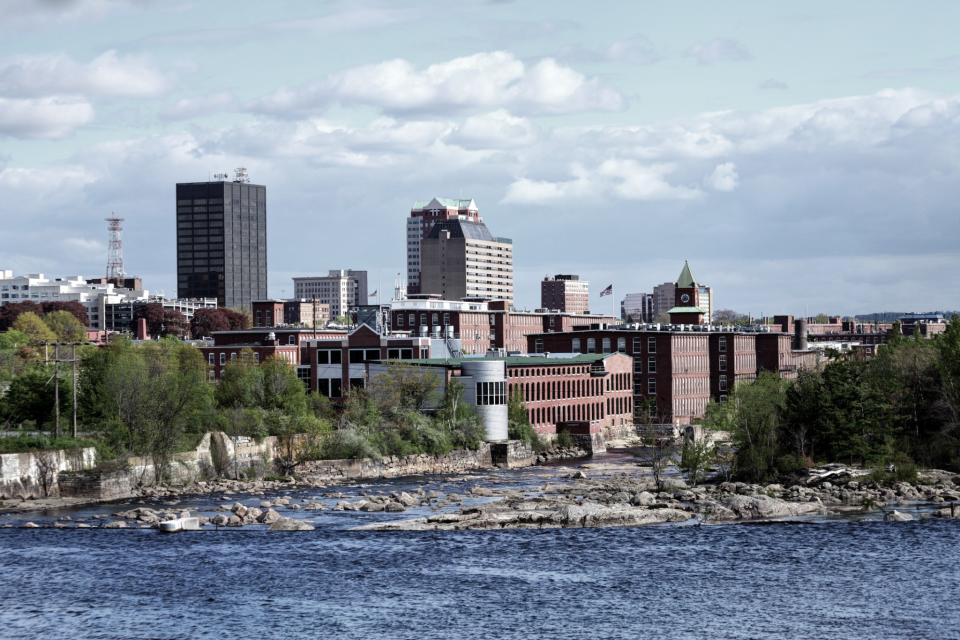16 places that shaped the 2016 election: Manchester, N.H.

By Nov. 9, the votes will have been cast and counted, there will be a winner and a loser, and the country will begin a slow return to normal. Historians will have their say on the outcome, but all of us who have lived through this election will carry away indelible memories of a shocking year in American history: of a handful of ordinary people, swept up in the rush of history; of a series of moments on which the fate of the nation seemed, at least briefly, to turn; and of places on the map that became symbols of a divided nation. As we count down to Election Day, Yahoo News has identified 16 unforgettable people, moments and places.
Donald Trump can be eloquent on the horrors of life for African-Americans in big cities. But Bedford, N.H, a well-off, overwhelmingly white suburb of Manchester, did not comport with Donald Trump’s view of drug addiction.
“You know what really amazed me when I came here and I got to know so many people?” Trump asked on a recent visit. “They said the biggest single problem they have up here is heroin. And I said how does heroin work with these beautiful lakes and trees?”
Every four years, as a presidential election looms, the nation awakens to the parochial concerns of the early-voting states, as candidates vie to show their devotion to ethanol subsidies for Iowa farmers. Traditionally, in rock-ribbed New Hampshire, the dog whistle is sounded for lower taxes and government debt, but in this cycle, a new and ominous issue surfaced: the epidemic of opioid addiction.
There were at least 433 fatal overdoses in the state last year, the third highest per-capita rate in the nation. And in New Hampshire, the worst-hit city was Manchester, with less than 10 percent of the state’s population but nearly a quarter of the fatalities.
So the candidates came, and they listened and learned. A stop at the Hope for New Hampshire treatment center in Concord was the new state fair visit for aspiring candidates this year, hosting Republicans Chris Christie, Jeb Bush, Carly Fiorina and Democrat Bernie Sanders. Christie, recalling his own mother’s struggle to give up cigarettes, and a friend who became addicted to painkillers, made a moving appeal to treat addiction medically. Sanders was the only candidate willing to call out the pharmaceutical industry for its role in promoting the use of prescription opioid painkillers, which are believed to be the gateway to the use of heroin and its terrifyingly potent synthetic analogue, fentanyl: “I think we got to talk to the pharmaceutical industry about what they’re producing, doctors what they’re prescribing, and then we have to make treatment available to people when they need it.”
Hillary Clinton had an exhaustively comprehensive, jargon-filled plan for “a $7.5 billion fund to support new federal-state partnerships over 10 years, through which stakeholders will come together to prevent and treat addiction.” Republicans, by and large, treated the problem as deserving of much more sympathy than federal funding. It was, however, a problem for which Donald Trump had a ready-made solution, which is also his solution for most problems: stricter border enforcement.
“We’re going to build a wall,” he said in a video posted to Facebook. “Believe me, I will solve the problem. They will stop coming to New Hampshire. They will stop coming to our country.”
He might have been onto something, as the results of the New Hampshire primary showed. — By Jerry Adler
Hillary Clinton unveils $10 billion plan to fight substance abuse
In an op-ed for the New Hampshire Union Leader, the Democratic nominee proposed a plan which included increased local drug prevention efforts for teens and expanded access to drug treatment for all addicts, including those charged with nonviolent or low-level drug offenses. >>>
Confronting America’s opioid epidemic
A series by Yahoo News’ Caitlin Dickson that covers how opioids affect the brain, different methods treatment, the origin of the crisis and government responses to the problem. >>>
We will stop heroin and other drugs from coming into New Hampshire from our open southern border. We will build a WALL and have security.
— Donald J. Trump (@realDonaldTrump) February 9, 2016
Thrilled to hear HHS announced $100 million to help states address opioid abuse & expand treatment. This is an epidemic we must end. -H
— Hillary Clinton (@HillaryClinton) July 26, 2015






